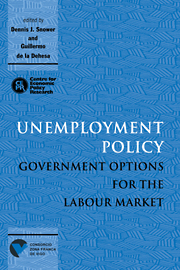Book contents
- Frontmatter
- Contents
- List of figures
- List of tables
- Preface
- Acknowledgements
- List of conference participants
- 1 Introduction
- PART ONE GENERAL POLICY ISSUES
- PART TWO DEMAND MANAGEMENT AND SUPPLY-SIDE POLICY
- 4 The role of demand-management policies in reducing unemployment
- Discussion
- 5 Edmund Phelps' theory of structural slumps and its policy implications
- Discussion
- Discussion
- PART THREE SUBSIDISING EMPLOYMENT AND TRAINING
- PART FOUR LABOUR MARKET REGULATIONS
- PART FIVE POLICY, JOB REALLOCATION AND THE UNEMPLOYMENT–PRODUCTIVITY RELATION
- PART SIX COMPARING UNEMPLOYMENT POLICIES
- Index
5 - Edmund Phelps' theory of structural slumps and its policy implications
Published online by Cambridge University Press: 07 September 2010
- Frontmatter
- Contents
- List of figures
- List of tables
- Preface
- Acknowledgements
- List of conference participants
- 1 Introduction
- PART ONE GENERAL POLICY ISSUES
- PART TWO DEMAND MANAGEMENT AND SUPPLY-SIDE POLICY
- 4 The role of demand-management policies in reducing unemployment
- Discussion
- 5 Edmund Phelps' theory of structural slumps and its policy implications
- Discussion
- Discussion
- PART THREE SUBSIDISING EMPLOYMENT AND TRAINING
- PART FOUR LABOUR MARKET REGULATIONS
- PART FIVE POLICY, JOB REALLOCATION AND THE UNEMPLOYMENT–PRODUCTIVITY RELATION
- PART SIX COMPARING UNEMPLOYMENT POLICIES
- Index
Summary
Introduction
For most of Western Europe present unemployment is undoubtedly a medium-term phenomenon and requires medium-term policies. Public opinion has well perceived the problem but has lost confidence in economists, precisely because they have proved unable to produce a clear common proposal on what ought to be done. Indeed, a suitable macroeconomic theory for the analysis of the medium-term unemployment phenomenon is not yet recognised to exist. When considering the policy challenge, we economists rely on our intuition as much as on objective science. It is then not surprising that we do not agree.
Some of us draw on the theory of temporary equilibrium with the market imbalances that were found to hold in the short run; the successive temporary equilibria are linked by macroeconomic adjustment laws, which also were found to hold in the short run, but become more and more questionable as the horizon is extended further into the future. Others among us start from the opposite end, namely from the growth theory, which was initially meant to be appropriate for longterm trends; the theory, enriched by the introduction of uncertainty and random shocks, is now taken by some as appropriate for the study of business cycles, real or not, with no market imbalances, even the most obvious ones. Many feel uneasy with the resulting theoretical split, particularly when they consider the medium run, for which they do not know where to turn.
- Type
- Chapter
- Information
- Unemployment PolicyGovernment Options for the Labour Market, pp. 116 - 141Publisher: Cambridge University PressPrint publication year: 1997
- 2
- Cited by



